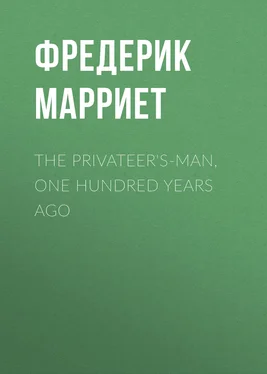Фредерик Марриет - The Privateer's-Man, One hundred Years Ago
Здесь есть возможность читать онлайн «Фредерик Марриет - The Privateer's-Man, One hundred Years Ago» — ознакомительный отрывок электронной книги совершенно бесплатно, а после прочтения отрывка купить полную версию. В некоторых случаях можно слушать аудио, скачать через торрент в формате fb2 и присутствует краткое содержание. Издательство: Иностранный паблик, Жанр: Альтернативная история, literature_19, foreign_antique, foreign_prose, Исторические приключения, на английском языке. Описание произведения, (предисловие) а так же отзывы посетителей доступны на портале библиотеки ЛибКат.
- Название:The Privateer's-Man, One hundred Years Ago
- Автор:
- Издательство:Иностранный паблик
- Жанр:
- Год:неизвестен
- ISBN:нет данных
- Рейтинг книги:3 / 5. Голосов: 1
-
Избранное:Добавить в избранное
- Отзывы:
-
Ваша оценка:
- 60
- 1
- 2
- 3
- 4
- 5
The Privateer's-Man, One hundred Years Ago: краткое содержание, описание и аннотация
Предлагаем к чтению аннотацию, описание, краткое содержание или предисловие (зависит от того, что написал сам автор книги «The Privateer's-Man, One hundred Years Ago»). Если вы не нашли необходимую информацию о книге — напишите в комментариях, мы постараемся отыскать её.
The Privateer's-Man, One hundred Years Ago — читать онлайн ознакомительный отрывок
Ниже представлен текст книги, разбитый по страницам. Система сохранения места последней прочитанной страницы, позволяет с удобством читать онлайн бесплатно книгу «The Privateer's-Man, One hundred Years Ago», без необходимости каждый раз заново искать на чём Вы остановились. Поставьте закладку, и сможете в любой момент перейти на страницу, на которой закончили чтение.
Интервал:
Закладка:
But although inspirited by such a prosperous beginning, our inferiority in men was so great that our captain considered it his duty to make all sail in hopes of being able to avoid such an unequal combat. This our enemies attempted to prevent by a most furious cannonade, which we received and returned without flinching, making a running fight of it, till at last our fore yard and foretop-mast being shot away, we had no longer command of the vessel. Finding that, although we were crippled and could not escape, our fire continued unabated, both the vessels again made preparations for boarding us, while we on our part prepared to give them a warm reception.
As we knew that the Frenchman, who was our most serious opponent, must board us on our weather bow, we traversed over four of our guns loaded to the muzzle with musket balls to receive him, and being all ready with our pateraroes and hand grenades, we waited for the attack. As he bore down for our bows, with all his men clinging like bees, ready for the spring, our guns were discharged and the carnage was terrible. The men staggered back, falling down over those who had been killed or wounded, and it required all the bravery and example of the French captain, who was really a noble fellow, to rally the remainder of his men, which at last he succeeded in doing, and about forty of them gained our forecastle, from which they forced our weak crew, and retained possession, not following up the success, but apparently wailing till they were seconded by the Spaniard’s boarding us on our lee quarter, which would have placed us between two fires, and compelled us to divide our small force.
By this time the wind, which had been light, left us, and it was nearly a calm, with a swell on the sea, which separated the two vessels; the Spaniard, who was ranging up under our lee, having but little way and not luffing enough, could not fetch us, but fell off and drifted to leeward. The Frenchmen who had been thrown on board, and who retained possession of our forecastle, being thus left without support from their own vessel, which had been separated from us by the swell, or from the Spaniard, which had fallen to leeward, we gave three cheers, and throwing a number of hand-grenades in among them, we rushed forward with our half-pikes, and killed or drove every soul of them overboard, one only, and he wounded in the thigh, escaped by swimming back to his own vessel. Here, then, was a pause in the conflict, and thus ended, I may say, the second act.
Hitherto the battle had been fought with generous resolution; but after this hand-to-hand conflict, and the massacre with which it ended, both sides appeared to have been roused to ferocity. A most infernal cannonade was now renewed by both our antagonists, and returned by us with equal fury; but it was now a dead calm, and the vessels rolled so much with the swell, that the shot were not so effective. By degrees we separated more and more from our enemies, and the firing was now reduced to single guns. During this partial cessation our antagonists had drawn near to each other, although at a considerable distance from us. We perceived that the Spaniard was sending two of his boats full of men to supply the heavy loss sustained by his comrade. Captain Weatherall ordered the sweeps out, and we swept our broadside to them, trying by single guns to sink the boats as they went from one vessel to the other. After two or three attempts, a gun was successful; the shot shattered the first of the boats, which instantly filled and went down. The second boat pulled up and endeavoured to save the men, but we now poured our broadside upon them, and, daunted by the shot flying about them, they sought their own safety by pulling back to the vessel, leaving their sinking companions to their fate. Failing in this attempt, both vessels recommenced their fire upon us, but the distance and the swell of the sea prevented any execution, and at last they ceased firing, waiting till a breeze should spring up which might enable them to renew the contest with better success.
At this time it was about eleven o’clock in the forenoon, and the combat had lasted about five hours. We refreshed ourselves after the fatigue and exertion which we had undergone, and made every preparation for a renewal of the fight. During the engagement we were so excited, that we had no time to think; but now that we were cool again and unoccupied, we had time to reflect upon our position, and we began to feel dejected and apprehensive. Fatigued with exertion, we were weak and dispirited. We knew that our best men were slain or groaning under their severe wounds, that the enemy were still numerous, and as they persevered after so dreadful a slaughter, that they were of unquestionable bravery and resolution. Good fortune, and our captain’s superior seamanship had, up to the present, enabled us to make a good fight, but fortune might desert us, and our numbers were so reduced, that if the enemy continued resolute, we must be overpowered. Our gallant captain perceived the despondency that prevailed, and endeavoured to remove it by his own example and by persuasion. After praising us for the resolution and courage we had already shown, he pointed out to us that whatever might be the gallantry of the officers, it was clear that the men on board of the opposing vessels were awed by their heavy loss and want of success, and that if they made one more attempt to take us by the board and failed, which he trusted they would do, no persuasion would ever induce them to try it again, and the captains of the vessels would give over such an unprofitable combat. He solemnly averred that the colours should never be struck while he survived, and demanded who amongst us were base enough to refuse to stand by them. Again we gave him three cheers, but our numbers were few, and the cheers were faint compared with the first which had been given, but still we were resolute, and determined to support our captain and the honour of our flag. Captain Weatherall took care that this feeling should not subside—he distributed the grog plentifully; at our desire he nailed the colours to the mast, and we waited for a renewal of the combat with impatience. At four o’clock in the afternoon a breeze sprang up, and both vessels trimmed their sails and neared us fast—not quite in such gallant trim as in the morning it is true—but they appeared now to have summoned up a determined resolution. Silently they came up, forcing their way slowly through the water; not a gun was fired, but the gaping mouths of the cannon, and their men motionless at their quarters, portended the severity of the struggle which was now to decide this hitherto well-contested trial for victory. When within half a cable’s length, we saluted them with three cheers, they returned our defiance, and running up on each side of us, the combat was renewed with bitterness.
The Frenchman would not this time lay us on board until he was certain that the Spaniard had boarded us to leeward—he continued luffing to windward and plying us with broadsides until we were grappled with the Spaniard, and then he bore down and laid his gunwale on our bow. The Spaniard had already boarded us on the quarter, and we were repelling this attack, when the Frenchman laid us on the bow. We fought with desperation, and our pikes gave us such an advantage over the swords and knives of the Spaniards, that they gave ground, and appalled by the desperate resistance they encountered, quitted our decks strewed with their dead and dying shipmates, and retreated in confusion to their own vessel. But before this repulse had been effected, the French had boarded us on the weather-bow, and driving before them the few men who had been sent forward to resist them, had gained our main deck, and forced their way to the rise of the quarter-deck, where all our remaining men were now collected. The combat was now desperate, but after a time our pikes, and the advantage of our position, appeared to prevail over numbers. We drove them before us—we had regained the main deck, when our brave commander, who was at our head, and who had infused spirit into us all, received a bullet through his right wrist; shifting his sword into his left hand, he still pressed forward encouraging us, when a ball entered his breast and he dropped dead. With his fall, fell the courage and fortitude of his crew so long sustained—and to complete the mischief, the lieutenant and two remaining officers also fell a few seconds after him. Astonished and terrified, the men stopped short in their career of success, and wildly looked round for a leader. The French, who had retreated to the forecastle, perceiving our confusion, renewed the attack, our few remaining men were seized with a panic, and throwing down our arms, we asked for quarter where a moment before victory was in our hands—such was the finale of our bloody drama.
Читать дальшеИнтервал:
Закладка:
Похожие книги на «The Privateer's-Man, One hundred Years Ago»
Представляем Вашему вниманию похожие книги на «The Privateer's-Man, One hundred Years Ago» списком для выбора. Мы отобрали схожую по названию и смыслу литературу в надежде предоставить читателям больше вариантов отыскать новые, интересные, ещё непрочитанные произведения.
Обсуждение, отзывы о книге «The Privateer's-Man, One hundred Years Ago» и просто собственные мнения читателей. Оставьте ваши комментарии, напишите, что Вы думаете о произведении, его смысле или главных героях. Укажите что конкретно понравилось, а что нет, и почему Вы так считаете.












